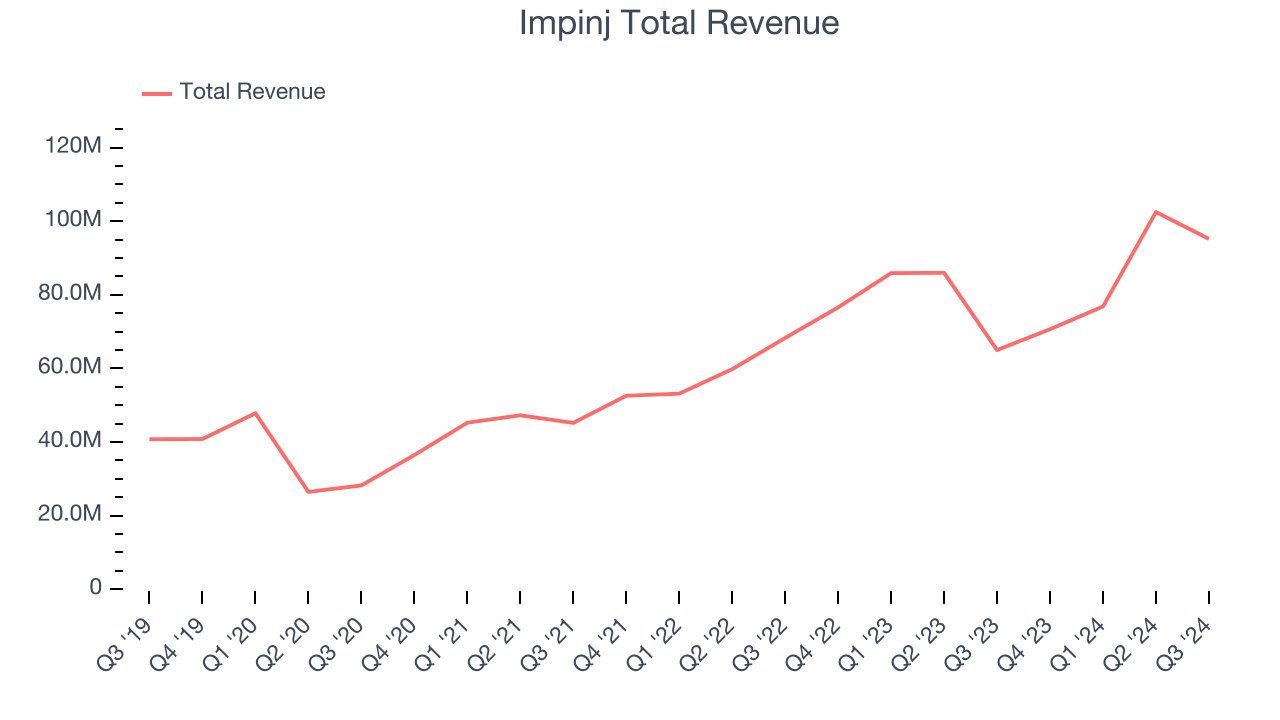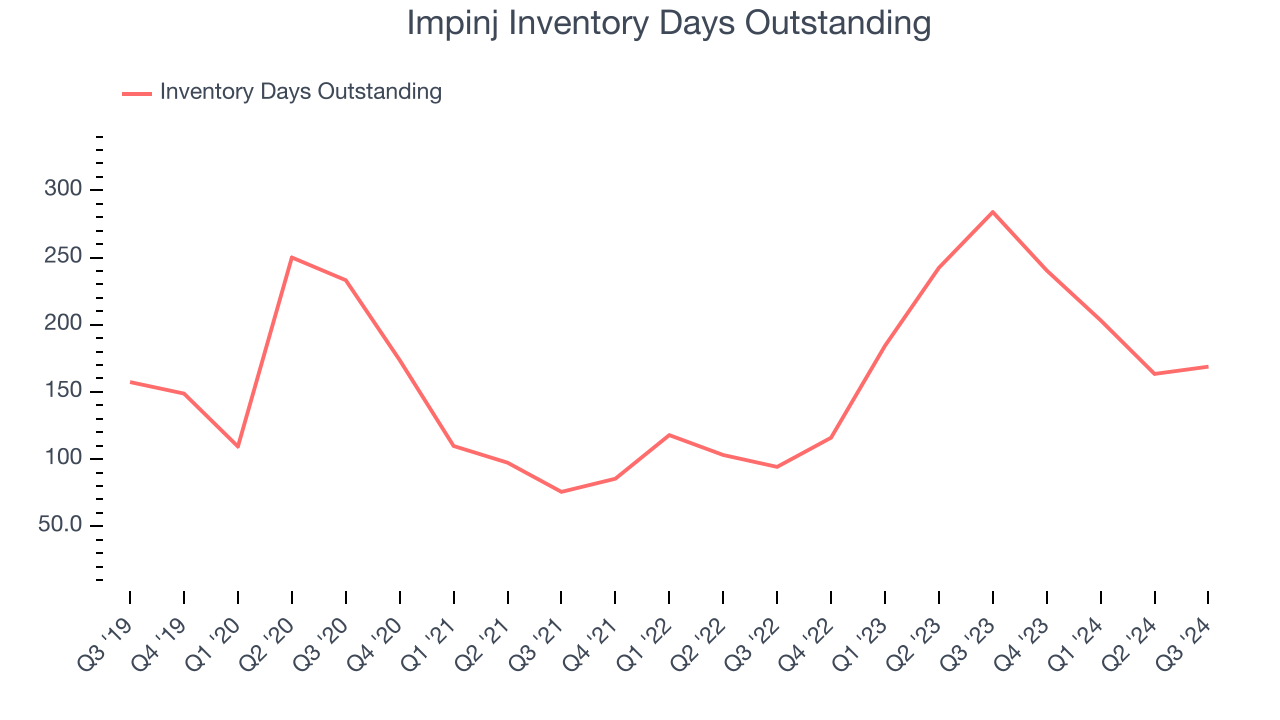
RFID manufacturer Impinj (NASDAQ: PI) reported Q3 CY2024 results exceeding the market’s revenue expectations, with sales up 46.4% year on year to $95.2 million. Guidance for next quarter’s revenue was also optimistic at $92.5 million at the midpoint, 2.7% above analysts’ estimates. Its non-GAAP profit of $0.56 per share was also 17.2% above analysts’ consensus estimates.
Is now the time to buy Impinj? Find out by accessing our full research report, it’s free.
Impinj (PI) Q3 CY2024 Highlights:
- Revenue: $95.2 million vs analyst estimates of $92.88 million (2.5% beat)
- Adjusted EPS: $0.56 vs analyst estimates of $0.48 (17.2% beat)
- EBITDA: $17.32 million vs analyst estimates of $15.62 million (10.9% beat)
- Revenue Guidance for Q4 CY2024 is $92.5 million at the midpoint, above analyst estimates of $90.09 million
- Adjusted EPS guidance for Q4 CY2024 is $0.47 at the midpoint, above analyst estimates of $0.40
- Gross Margin (GAAP): 50%, up from 47.3% in the same quarter last year
- Inventory Days Outstanding: 169, up from 163 in the previous quarter
- Operating Margin: -0.8%, up from -24.4% in the same quarter last year
- EBITDA Margin: 18.2%, up from 0.4% in the same quarter last year
- Free Cash Flow was $4.66 million, up from -$4.48 million in the same quarter last year
- Market Capitalization: $6.28 billion
“Our third-quarter results were strong, with revenue and profitability well above our guidance,” said Chris Diorio, Impinj co-founder and CEO.
Company Overview
Founded by Caltech professor Carver Mead and one of his students Chris Diorio, Impinj (NASDAQ: PI) is a maker of radio-frequency identification (RFID) hardware and software.
Analog Semiconductors
Demand for analog chips is generally linked to the overall level of economic growth, as analog chips serve as the building blocks of most electronic goods and equipment. Unlike digital chip designers, analog chip makers tend to produce the majority of their own chips, as analog chip production does not require expensive leading edge nodes. Less dependent on major secular growth drivers, analog product cycles are much longer, often 5-7 years.
Sales Growth
Examining a company’s long-term performance can provide clues about its business quality. Any business can put up a good quarter or two, but the best consistently grow over the long haul. Thankfully, Impinj’s 18.7% annualized revenue growth over the last five years was exceptional. This is a great starting point for our analysis because it shows Impinj’s offerings resonate with customers.
Semiconductors are a cyclical industry, and long-term investors should be prepared for periods of high growth followed by periods of revenue contractions (which can sometimes offer opportune times to buy).
Long-term growth is the most important, but recency is neccessary for semiconductors because of Moore's Law, which suggests the pace of technological innovation is so high that yesterday's hit new product could be obsolete today. Impinj’s annualized revenue growth of 21.5% over the last two years is above its five-year trend, suggesting its demand was strong and recently accelerated.
This quarter, Impinj reported magnificent year-on-year revenue growth of 46.4%, and its $95.2 million of revenue beat Wall Street’s estimates by 2.5%. Management is currently guiding for a 30.9% year-on-year increase next quarter.
Looking further ahead, sell-side analysts expect revenue to grow 21.3% over the next 12 months, similar to its two-year rate. This projection is admirable and illustrates the market sees some success for its newer products and services.
Here at StockStory, we certainly understand the potential of thematic investing. Diverse winners from Microsoft (MSFT) to Alphabet (GOOG), Coca-Cola (KO) to Monster Beverage (MNST) could all have been identified as promising growth stories with a megatrend driving the growth. So, in that spirit, we’ve identified a relatively under-the-radar profitable growth stock benefitting from the rise of AI, available to you FREE via this link.
Product Demand & Outstanding Inventory
Days Inventory Outstanding (DIO) is an important metric for chipmakers, as it reflects a business’ capital intensity and the cyclical nature of semiconductor supply and demand. In a tight supply environment, inventories tend to be stable, allowing chipmakers to exert pricing power. Steadily increasing DIO can be a warning sign that demand is weak, and if inventories continue to rise, the company may have to downsize production.

This quarter, Impinj’s DIO came in at 169, which is 9 days above its five-year average, suggesting that the company’s inventory has grown to higher levels than we’ve seen in the past.
Key Takeaways from Impinj’s Q3 Results
We were impressed by Impinj’s optimistic EBITDA forecast for next quarter, which blew past analysts’ expectations. We were also excited its EBITDA outperformed Wall Street’s estimates. On the other hand, its inventory levels increased. Zooming out, we think this was a solid quarter. The stock traded up 1.5% to $224.50 immediately following the results.
Sure, Impinj had a solid quarter, but if we look at the bigger picture, is this stock a buy?The latest quarter does matter, but not nearly as much as longer-term fundamentals and valuation, when deciding if the stock is a buy.We cover that in our actionable full research report which you can read here, it’s free.

